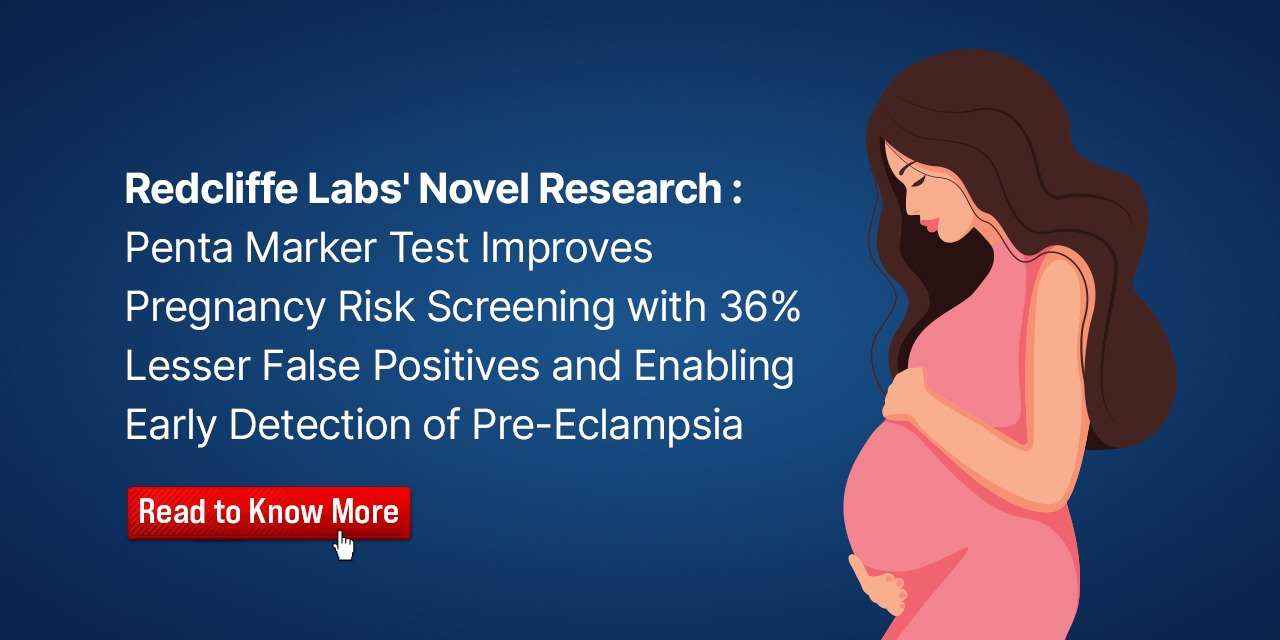Redcliffe Labs Research Unveils Penta Marker Screening has 36% Lower False Positives and Increased Accuracy

Medically Reviewed By
Prof. Ashok Rattan
Written By Sheena Mehta
on Mar 21, 2025
Last Edit Made By Sheena Mehta
on Jul 19, 2025

Redcliffe Labs' groundbreaking study unveils the Penta Marker Test, which can potentially reduce false positives by 36%, facilitating the early detection of pre-eclampsia and chromosomal irregularities during the first trimester.
Additionally, the Penta Marker Test eliminates the need for a follow-up test by providing results within three days, unlike other prenatal screening options that take more than three weeks to generate a definite diagnosis.
The Penta Marker Test serves as an economical alternative that reduces the need to depend on procedures that might even break your fixed deposits, such as amniocentesis, which may be small but comes with a notable risk of miscarriage.
This novel research was conducted under the supervision of Dr. Ankur Jindal, head of the Department of Cytogenetics, National Reference Laboratory, Redcliffe Labs, Noida, Uttar Pradesh, and Krishan Kumar, Department of Clinical Biochemistry And Special Assays, National Reference Laboratory, Redcliffe Labs, Noida, Uttar Pradesh. It was covered in the International Journal of Scientific Research.
12 March 2025:
Prenatal screening plays a crucial role in finding genetic disorders like Down syndrome, which can prove fatal for a developing baby. Since these conditions are not curable, having an accurate and prompt diagnosis is vital for enabling parents to make informed decisions and for healthcare providers to manage potential complications.
Traditional first-trimester screening methods consider two blood markers (beta-hCG and PAPP-A) and an ultrasound (Nuchal Translucency). However, this approach is always higher at providing false positives, resulting in unnecessary anxiety and prompting invasive follow-up tests.
Second-trimester evaluations, like the Triple Marker Test, are noninvasive imaging techniques. They are typically performed between weeks 15 and 22 of gestation. Generally, they offer lower accuracy and limit opportunities for early intervention.
Redcliffe Labs is a renowned, pan-India omnichannel service provider, working round-the-clock to give India its right to quality diagnostics. The establishment unveiled the findings of a pioneer research study on prenatal screening. It drew attention to the Penta Marker Screening by incorporating three additional biomarkers —--AFP, PLGF, and Inhibin-A—resulting in greater accuracy. It could be related to identifying high-risk pregnancies, reducing false positive results, and rapid turnaround time and affordability, alleviating parental anxiety and enabling better pregnancy management.
Further, as a part of the study, after collecting samples between 11-13 + 6 weeks of gestation to detect aneuploidy from a cohort of 1,159 pregnant women, it was found that the Penta Marker Test detected 11 women with high-risk pregnancies. However, the traditional screening method pinpointed 17 women with genetic disorders risk, resulting in a notable decrease of 36% decrease in false positives. This improvement helps reduce unnecessary stress and burden and invasive follow-up procedures for expectant parents.
Furthermore, Redcliffe Labs’ research underscored that this non-invasive prenatal screening method can support early pre-eclampsia detection and reduce the need for invasive procedures. Pre-eclampsia is a high blood pressure (hypertension) disorder that occurs during pregnancy. Nonetheless, other disorders can happen too, such as gestational hypertension usually begins after 20 weeks of pregnancy, and may develop preeclampsia. If not managed during pregnancy, this condition can prove life-threatening.
The penta marker screening aids in detecting preeclampsia early, allowing doctors to prevent measures such as administering aspirin, which can greatly enhance outcomes for both mothers and their babies.
Another significant benefit of this advanced prenatal screening is that it decreases the necessity for invasive procedures. Lower false positive results mean a reduced number of referrals for diagnostic tests like amniocentesis, which is slightly less risky for miscarriage. This ultimately leads to a safer and less anxiety-inducing experience for expectant parents.
Redcliffe Labs is committed to serving its customers with empathy, precision, and unwavering support. It believes that the right diagnosis is the first step to healing and investing in the latest state-of-the-art equipment and technologies to ensure precise and reliable test results within deadlines.
Consequently, the Penta Marker Test's turnaround time is just 3 days, making it far quicker than conventional methods, which stretch the process by 3 weeks. This eliminates the need for prolonged waiting and costly follow-ups. The test empowers doctors with timely information, facilitating quicker clinical decisions and prompt interventions when they matter the most.
Dr. Ankur Jindal, Consultant of Cytogenetics at Redcliffe Labs, stated, “Our research is a major step forward in prenatal screening. The penta marker screening improves the precision of genetic risk evaluation, alleviates parental stress, and supports enhanced pregnancy management. Its quick turn-around-time and cost-effectiveness make it especially appropriate for routine prenatal care.”
Aditya Kandoi, CEO and Founder of Redcliffe Labs, highlighted the study's wider implications. He stated, “At Redcliffe Labs, we are committed to enhancing diagnostic research to better maternal health and pregnancy outcomes. Our results reaffirm the capability of penta marker screening to revolutionize prenatal care, ensuring safer pregnancies while making precise screening accessible and affordable for everyone.”
He added, "Our advanced prenatal testing proved to be a cost-effective option compared to the traditional screening methods that facilitate a broader segment of the population, thereby fostering equitable maternal healthcare."
About Redcliffe Labs: Redcliffe Labs is an all-India omnichannel service provider working tirelessly to ensure all Indians have access to quality diagnostics. Its services extend to over 220 cities nationwide through a network of over 80 advanced laboratories supported by over 2000 collection centers and home collection services, catering to individuals in tier 1, 2, and 3 cities and beyond. The establishment has assisted over 7 million patients with high-quality diagnostics, showcasing a steadfast dedication to empowering Indians to manage their health effectively.



